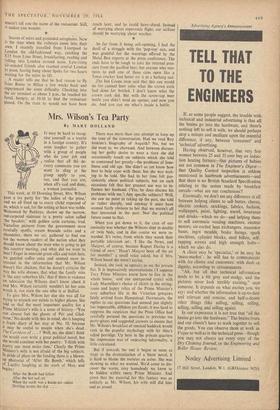Mrs. Wilson's Tea Party
By MARY HOLLAND
Jr may be hard to recog- nise yourself as a tourist in a foreign country. It's even tougher to gather with a group of people who do your job and , realise that all the de- risory comments you are wont to sling at the group apply to you, too, and that you are, when all's said and done, a woman journalist.
This week, at 10 Downing Street, Mrs. Wilson gave a tea party for 'the ladies of the press,' and we all lived up to every cliche expected of us, which is sad, for the setting at least was noble. Welcomed by flunkeys, shown up the narrow, red-carpeted staircase, to a pretty salon called 'the boudoir,' with golden satin curtains, trad. Victorian pictures from the government store carefully spotlit, cream brocade sofas and a chandelier, there we sat, gathered to find out for the women readers of the nation what they Should know about the man who is going to get this country moving, and what did we want to hear? Eager in emerald-green silks and mink hats, We guzzled coffee cake and seemed most in- terested in the information that Mr. Wilson doesn't like chicken, that he doesn't criticise the Way his wife dresses, that what the family miss IS 'the cosy suburban life,' that if there is violence on television the Wilsons don't know about it and Mrs. Wilson certainly wouldn't let her sons Watch it, not even the one who is at Balliol.
To give Mrs. Wilson her due she was all for trying to wrench our minds to higher planes. She told us that the most important quality for a Prime Minister's wife is a sense of history—'You can almost feel the ghosts of Pitt and Glad- stone.' No doubt with this in mind, she is keeping a frank diary of her stay at No. 10, because it may be useful to people when she's dead. The Corridors of. . . ? Well, no, she didn't think she would ever write a great political novel, but she would continue with her poetry: 'I think with Poetry one must make time.' Clearly the Prime Minister's wife is not afraid of the big subjects. In pride of place on the landing there is a blown- UP Photostat of 'After the Bomb,' which tells of Lucifer laughing at the work of Man, and begins:
After the Bomb had fallen After the last sad cry
When the earth was a burnt-out cinder Drifting across the sly. . . . There was more than one attempt to keep up the tone of the conversation. Had we read Roy Jenkins's biography of Asquith? No, but we did want to, we chorused. And between discuss- ing her guilty desire to wear a tiara she did occasionally touch on subjects which she told us concerned her greatly—the problems of lone- liness and old age. She didn't as yet know how best to help cope with these, but she was wait- ing to be told. She had in her time felt pas- sionately about political subjects, but on such occasions felt that her greatest use was to in- fluence her husband. ('Yes, he does discuss his problems with me.') Any specific subjects? Well, she saw no point in raking up the past, she told us rather sharply, and anyway it must have seemed fairly obvious to her that we weren't all that interested in the past. Nor the political future come to that.
When you got down to it, the crux of our curiosity was whether the WilsOns 'slept in double or twin beds, and in due course we were re- warded. It's twins, from which they watch their portable television set: 'I like the News, and Maigret, of course, because Rupert Davies is a friend of ours.' Hasn't Maigret been off the air for months?' a small voice asked, but if Mrs. Wilson heard she wasn't saying.
Instead, she took us upstairs to see the private flat. It is impressively unostentatious CI suppose Tory Prime Minsters know how to live in the whole house,' said one unexpected cynic) with Lady Macmillan's choice of chintz in the sitting- room and happy relics of the Prime Minister's cosy suburban life in the Victorian gewgaws lately arrived from Hampstead. Downstairs, the replies to our questions had seemed just slightly too impeccable, diffident yet fluent; it was hard to suppress the suspicion that the Press Office had carefully perused the questions to previous tea party-givers and suggested answers to ensure that Mr. Wilson's breakfast of smoked haddock would rank in the popular mythology with Sir Alec's salted porridge. Up here in the private quarters the impression was of endearing informality, a little calculated.
But if towards the end it began to seem as stagy as the dramatisation of a 'Snow novel, it is hard to blame the metteur en scene. She was showing us what we wanted. We'd come to dis- cover the warm, cosy homebody we knew to be hidden within every Prime Minister. And given that the material for this fantasy was as unlikely as Mr. Wilson, his wife still did him and us proud.


































 Previous page
Previous page